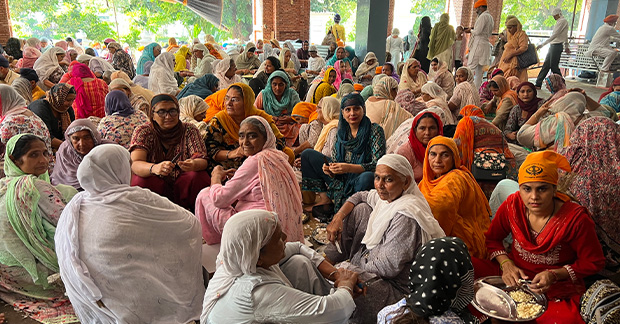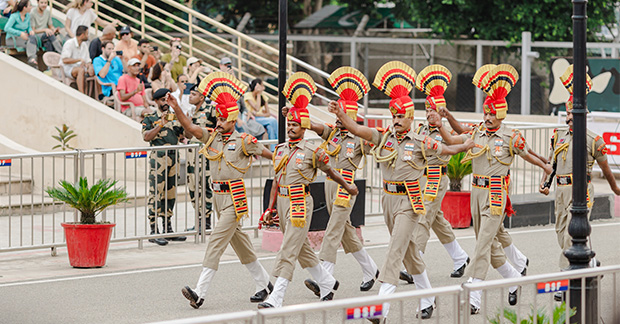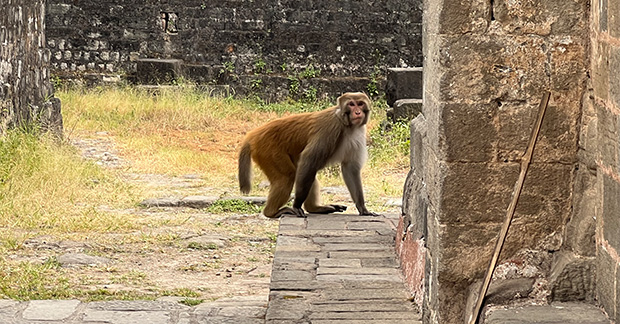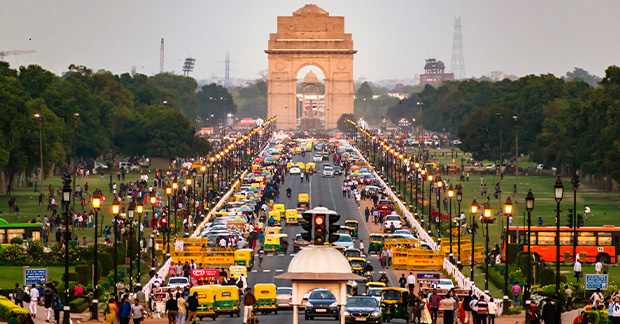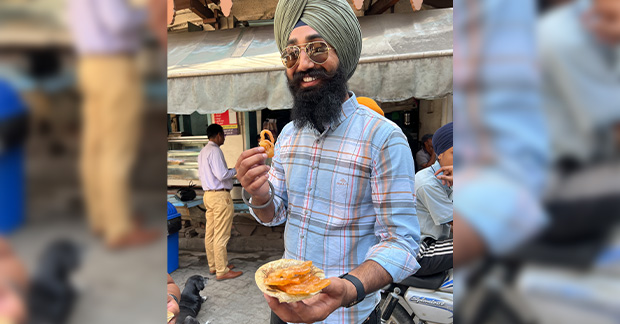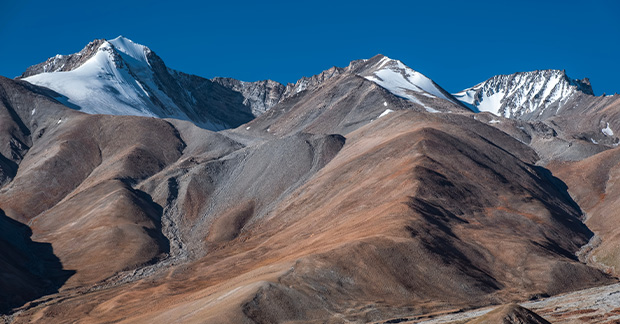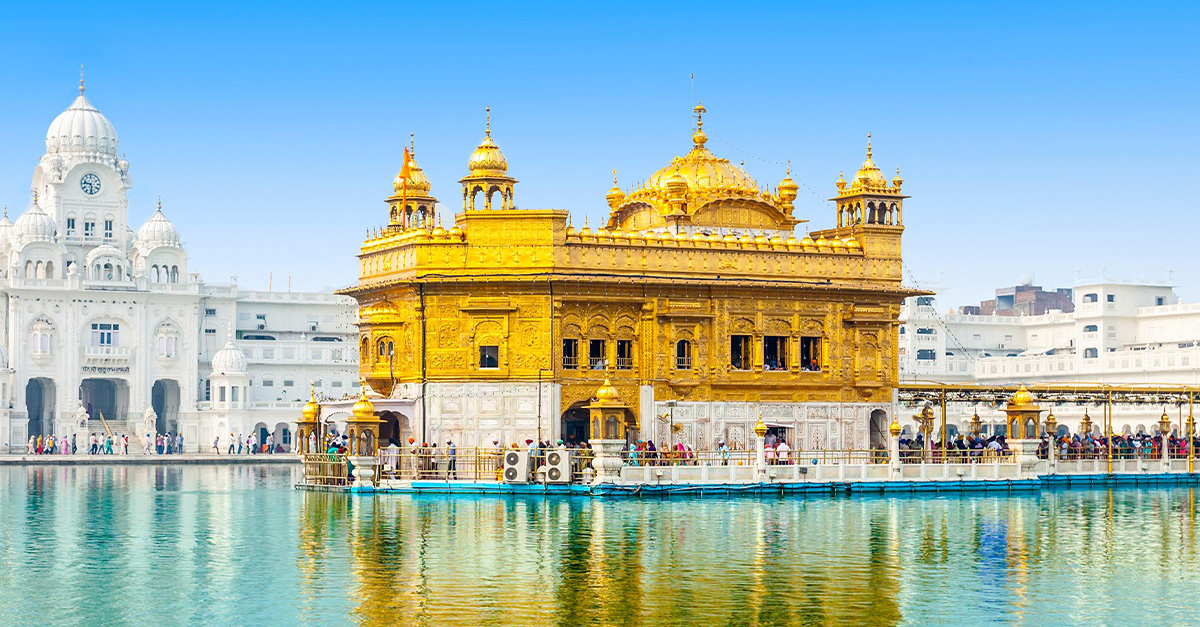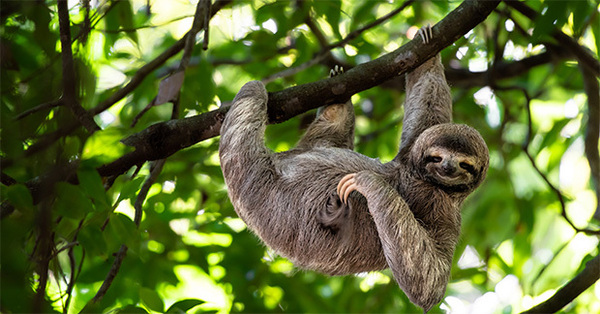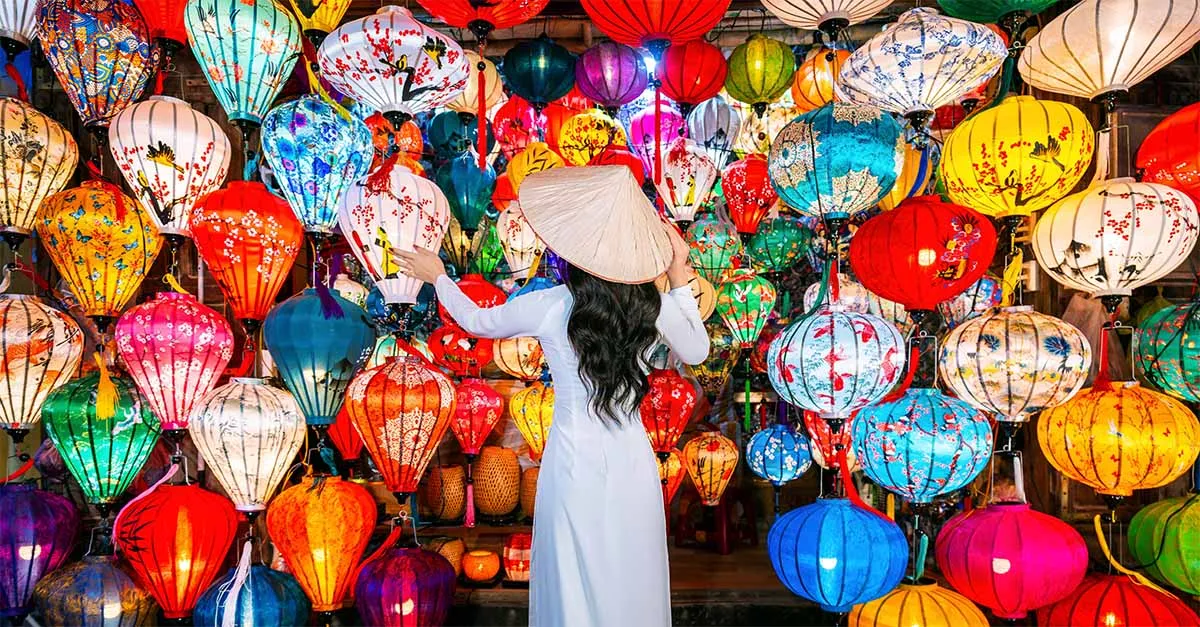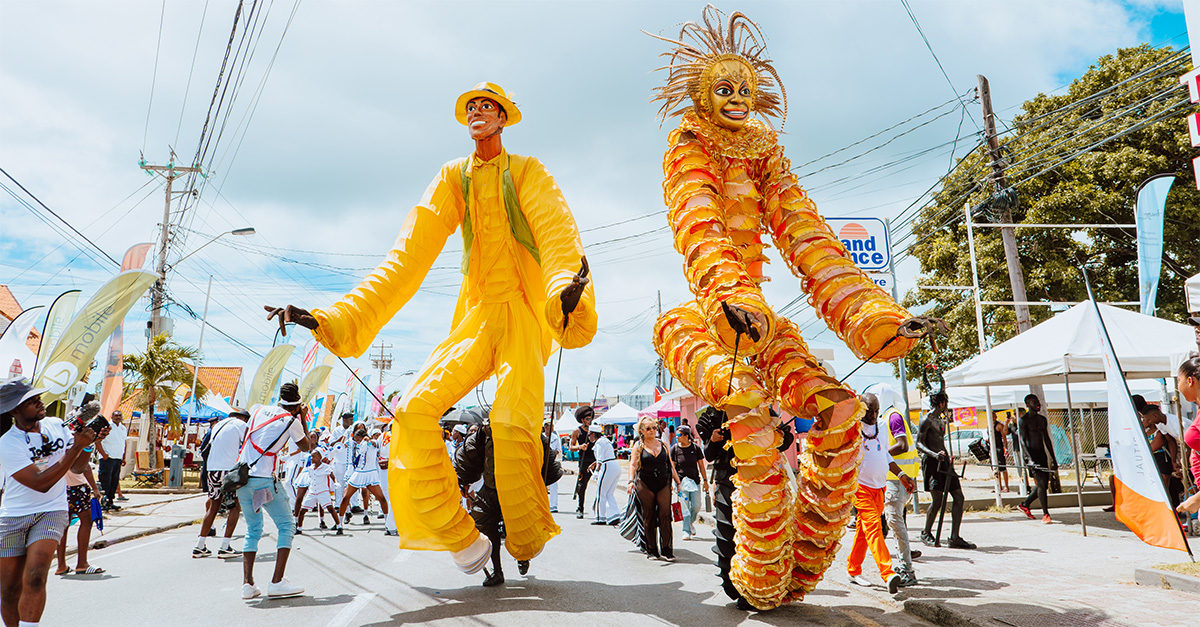You are viewing 2 of your 2 free articles
Why northern India is best seen by escorted tour
Exploring India with a local guide offers an unrivalled insight into the country, finds Beverley Watts
Click here to download and save as a PDF
I’m sitting on the terrace of the Singh farmstead home in the tiny village of Khasa, in India’s northwestern state of Punjab. Our guide, Jagroop Singh, has taken our Jules Verne tour group to meet his family and – as the sun sets over the surrounding fields – Jagroop’s mum is cooking us crispy chickpea pakoras over an open fire. This is an idyllic and immersive start to our taxi tour of Punjab and Himachal Pradesh.
India’s Punjab is a predominantly Sikh state. Jagroop talks proudly about his faith and explains that hair is an indispensable part of the human body, so his stays long and untrimmed. Wound around his topknot, his choice of colourful turban makes him easy to follow in the city streets of Amritsar.
The Golden Temple, the sacred nerve centre of the Sikh faith, has domes gilded in 24-carat gold. Here, the world’s biggest community kitchen, known as a langar in Punjabi, provides free meals for thousands of people every day.
Nimble-fingered volunteers, seated cross-legged on the ground, peel towering piles of garlic and make stacks of chapatis. Jagroop knows the ideal angles for photos and, with his help, we watch while being as unintrusive as possible.
He also steers our group to the best view of the evening Palki ceremony, a procession with the Sikh holy scripture, and whispers important advice on spiritual etiquette – we go into the gurdwara barefoot and cover our heads.
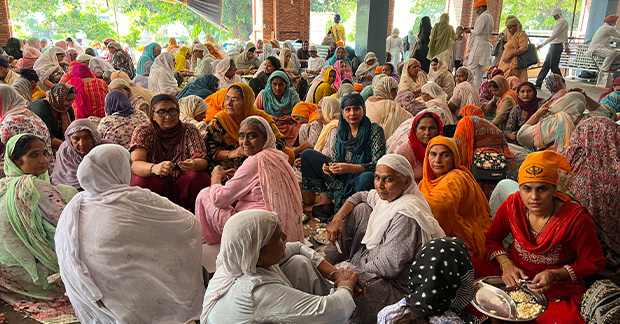
Golden Temple volunteers
India-Pakistan border ceremony
In the Partition Museum, we learn about the turbulent end to British rule in 1947, when India was divided, Pakistan was created and the Punjab region split in two. Today, at the Attari-Wagah border closing ceremony each evening, the scene is one of brotherhood. Indian and Pakistani guards shake hands and there’s much cheering and singing from onlookers. It would be easy to get lost in the animated crush that follows, but we’re gathered up by guide Surendra Rajawat, who escorts us through the crowd.
Though Punjab state is predominantly Sikh, 79% of India’s wider population is Hindu, and Surendra is our expert on the Hindu deities. Always informative and patient with a gentle smile, his calm companionship is invaluable. As well as English, he’s fluent in Hindi, Punjabi and Rajasthani.
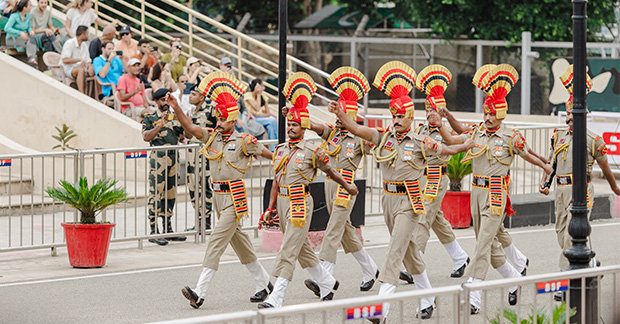
Attari-Wagah border closing ceremony
Driving to Dharamshala
Big coaches are unsuited to the twisting roads of the Lower Himalayas, so our transport into the mountains is a convoy of luxury Toyota Innova Crysta cars. At Kikar Lodge, India’s first private forest reserve, we arrive just in time for the Bonfire & Cocktails Safari, hosted by Kikar’s chief executive Amarindar Singh Chopra. On a peaceful hillside at twilight, in what was once big-cat country, we sip gin and tonics while seated around flickering flames.
“We’re committed to replanting trees, so leopards are returning to this land,” Amarindar tells us. But in the absence of any pairs of yellow eyes glowing in the darkness, we reassure ourselves that any rustle in the scrub is probably just a porcupine or muntjac deer. The next stop on our tour is the mountainous state of Himachal Pradesh, where there are monkeys everywhere.
We spot them in Dharamshala – where the Tibetan Buddhist leader, the Dalai Lama, is in exile – and on our way to the village of Rakh in the Kangra district for a misty morning walking tour. Accompanied by a community guide, it’s wonderful greeting villagers in the local dialect of Kangri as they tend their crops and grind wheat in the tiny, gushing watermill.
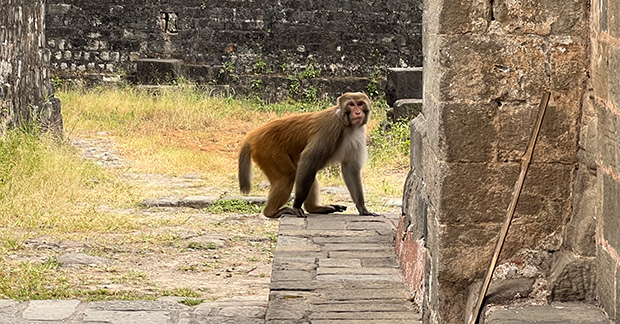
Macaque monkey
New Delhi tour
Hotel guests in the ex-British Raj resort of Shimla, which is 2,206m above sea level, are warned not to leave windows open, otherwise macaque monkeys are liable to slip inside and cause havoc. “The adults raid the fridge and their babies trampoline on the beds,” Surendra warns us. “And they’ll snatch your bag in the street – so beware.” We stay attentive.
On returning to Delhi, Eesha Singh of No Footprints – a community-driven organisation which now works with Jules Verne – gives us the Five Senses Tour of India’s capital.
New Delhi, with its burgeoning computer software industry, is now very modern but Old Delhi retains so much charm. Eesha is familiar with lesser-known historical sites and all the authentic places to shop. Chandni Chowk, close to the Red Fort, has been a busy market hub since the 17th century. We squeeze our way between the packed, narrow pavements on bicycle rickshaws. The shops, crammed high with brilliant silk saris, essential oils and sweets, are a kaleidoscopic delight. Our senses are truly alive.
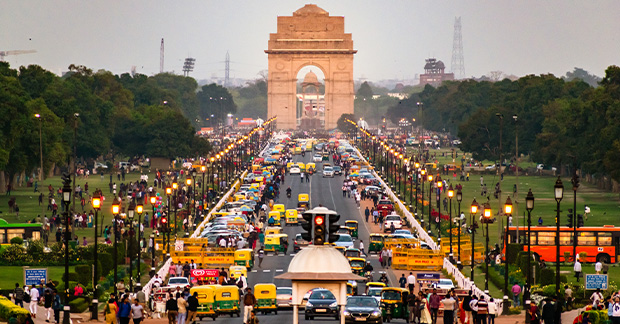
India Gate war memorial, New Delhi
Street food in India
Clients should embrace street food and drink when travelling with an expert guide. Jagroop’s favourite snack in Amritsar is a jalebi, a spiral of fried dough coated in syrup. Tea is the national drink of India, and Palampur in Himachal Pradesh, with its abundant water and a mild climate, is perfect for growing the fragrant shrub.
A tea-tasting experience at the Himalayan Brew tea company in the Kangra Valley is a treat. Surendra and I chat about our love of masala chai (milky tea with spices), served simply in roadside cafes without the flourishes sometimes added by high-end chefs. Imported wines are expensive in India but homegrown varieties, such as those produced by eco-friendly Sula Vineyards in the southern state of Karnataka, are widely available.
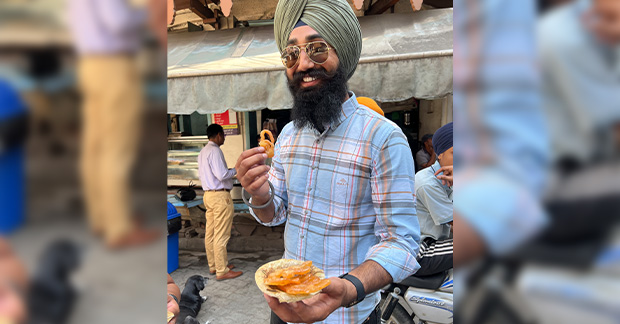
Guide Jagroop Singh
Alternative tours of India
For a guided walking holiday with village homestays, Indian tour operator Village Ways is trade-friendly. The 11-night Ramsay’s Ramble, in the Binsar region, starts at £1,195 in April and May 2024, including guesthouse accommodation but excluding flights.
villageways.com
Travel The Unknown offers The Himalayan Silk Road tour, a 15-night off-the-beaten-track guided itinerary from Kashmir to Ladakh. It costs from £3,995 for departures between July 21 and September 15, 2024, excluding international flights.
traveltheunknown.com
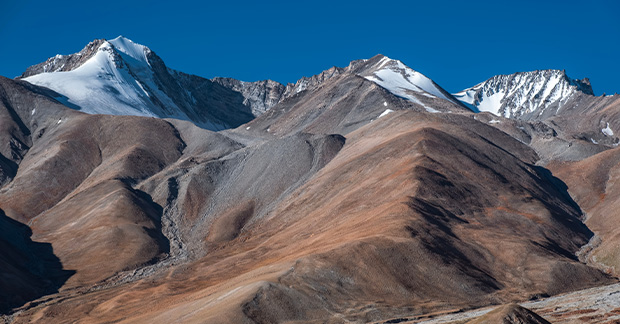
Book it
No Footprints’ Five Senses Tour in Delhi is a new addition to Jules Verne’s nine-night India’s Golden Triangle itinerary, which leads in at £1,895, departing April 13. Kikar Lodge, meanwhile, is new to the operator’s 20-night Secret Himalayan India tour. Prices start at £3,695, departing October 17. Both itineraries include Virgin Atlantic flights from Heathrow.
vjv.com
PICTURES: Shutterstock/saiko3p, Photo For Everything, Bhatakta Manav, Amit kg; B Watts
Read more
x.travelweekly.co.uk/destinations/wheelchair-accessible-holidays" target="_blank">5 of the best wheelchair-accessible holidays
x.travelweekly.co.uk/destinations/mixing-wellness-and-adventure-the-rise-of-the-zenventure-trip" target="_blank">Mixing wellness and adventure – the rise of the ‘Zenventure’ trip
x.travelweekly.co.uk/destinations/tips-on-how-to-sell-women-led-tours" target="_blank">Tips on how to sell women-led tours

